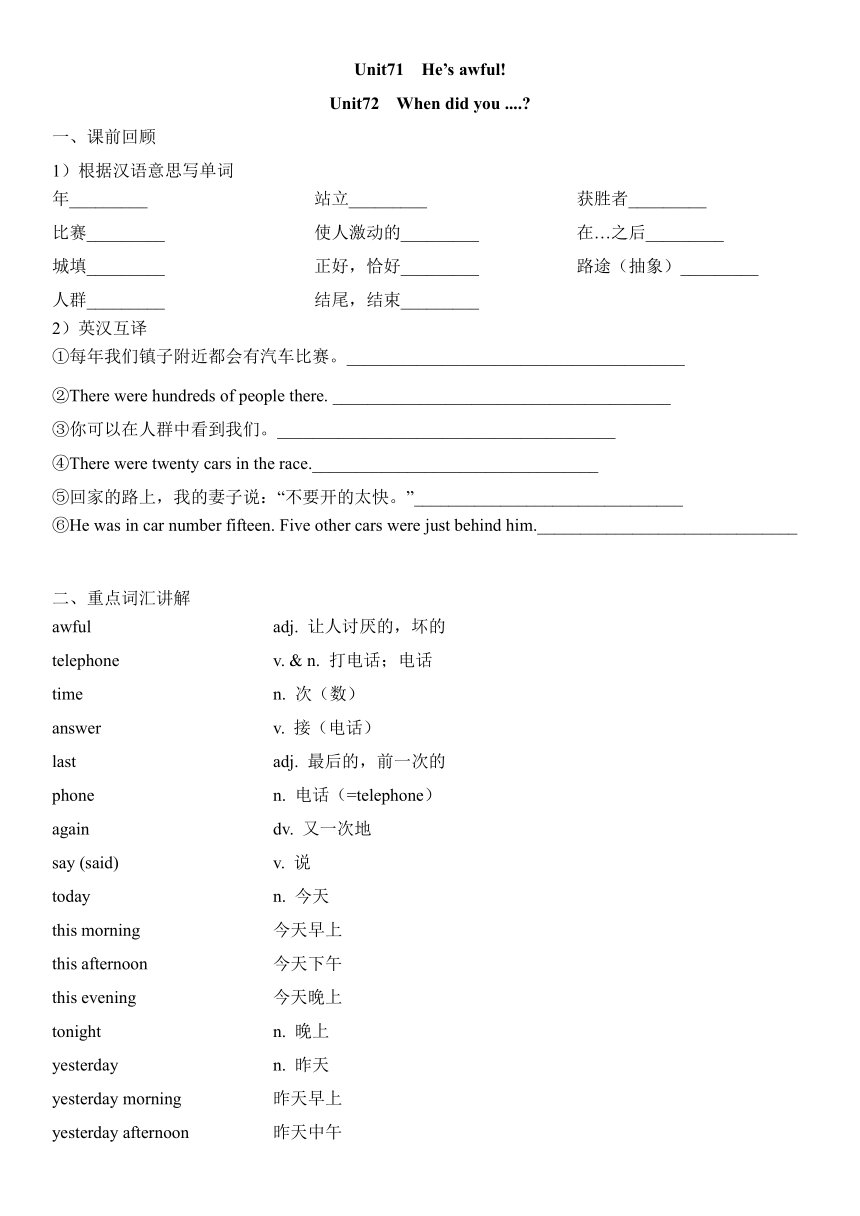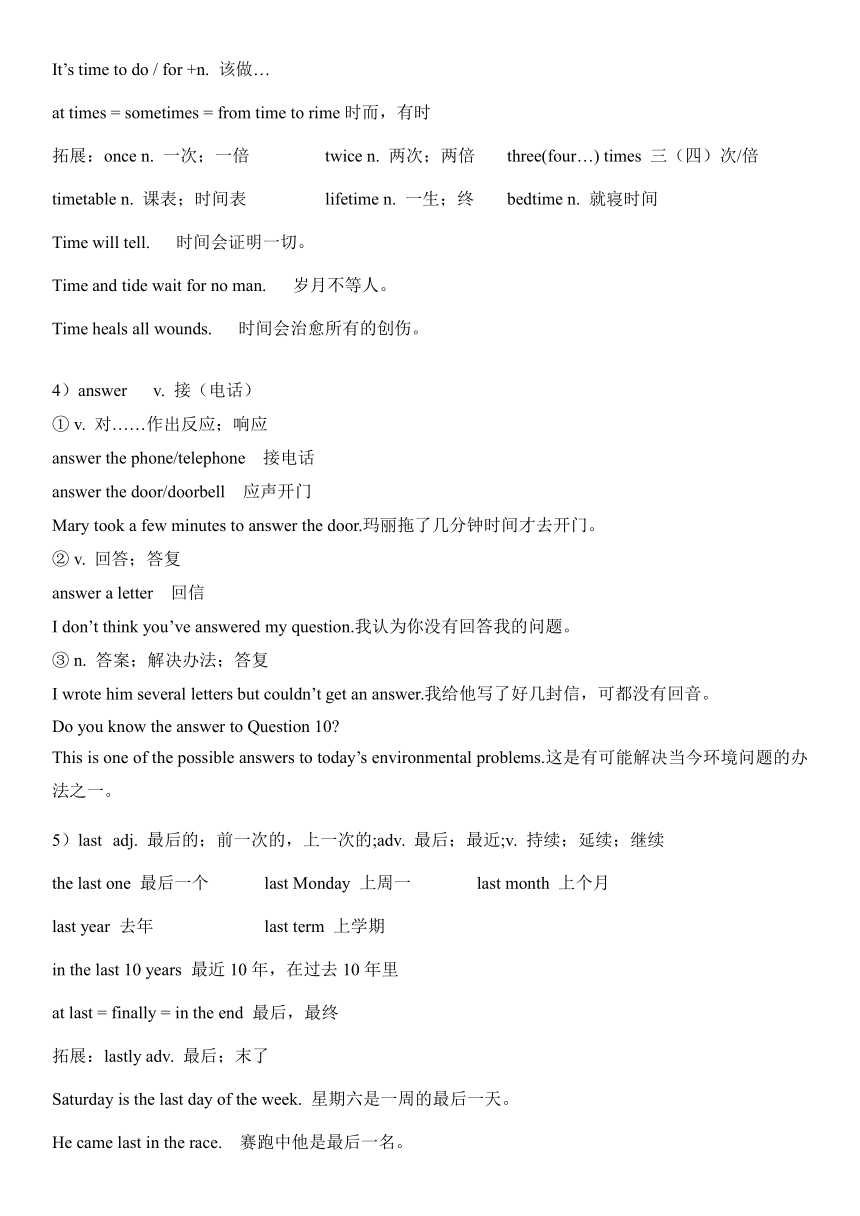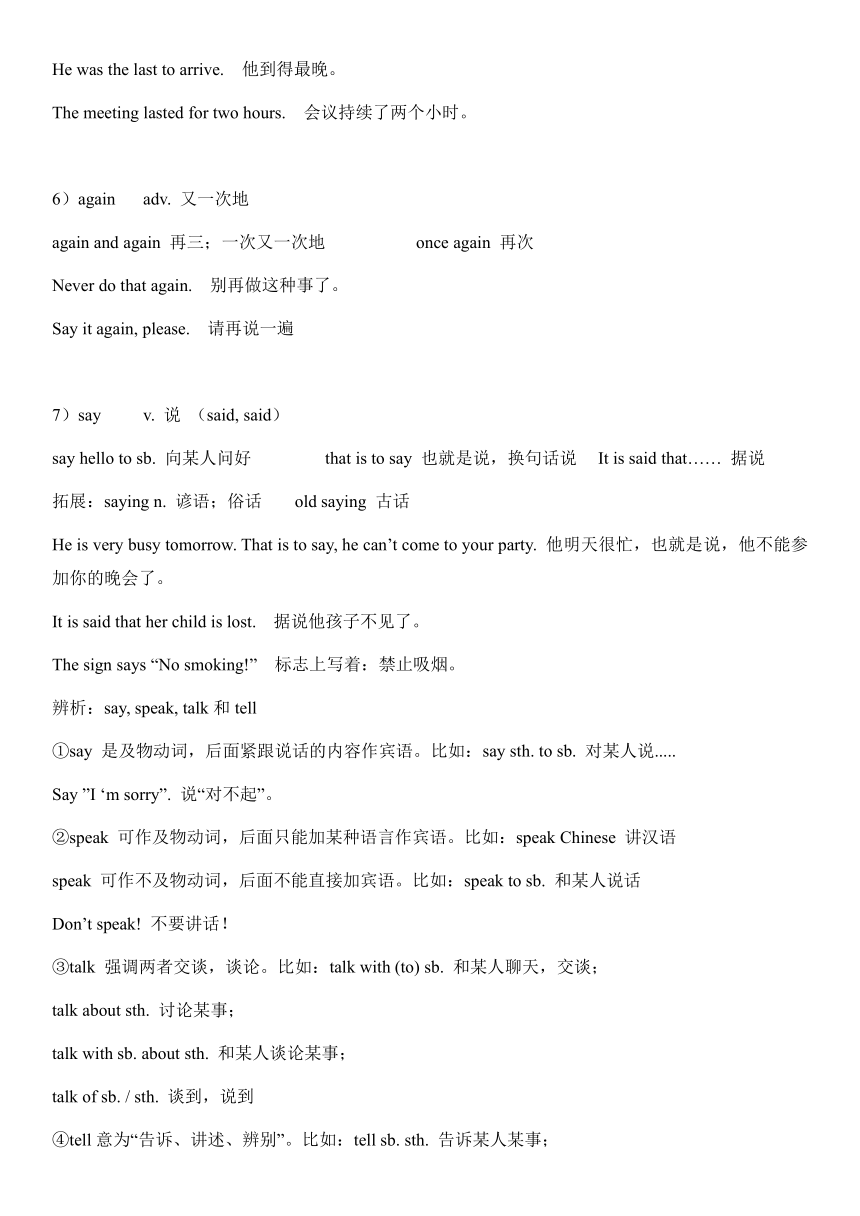新概念英语第一册Lessons 71-72 讲义
文档属性
| 名称 | 新概念英语第一册Lessons 71-72 讲义 |  | |
| 格式 | docx | ||
| 文件大小 | 26.2KB | ||
| 资源类型 | 教案 | ||
| 版本资源 | 新概念英语 | ||
| 科目 | 英语 | ||
| 更新时间 | 2024-04-28 17:29:26 | ||
图片预览




文档简介
Unit71 He’s awful!
Unit72 When did you ....
一、课前回顾
1)根据汉语意思写单词
年_________
比赛_________
城填_________
人群_________
站立_________
使人激动的_________
正好,恰好_________
结尾,结束_________
获胜者_________
在…之后_________
路途(抽象)_________
2)英汉互译
①每年我们镇子附近都会有汽车比赛。_______________________________________
②There were hundreds of people there. _______________________________________
③你可以在人群中看到我们。_______________________________________
④There were twenty cars in the race._________________________________
⑤回家的路上,我的妻子说:“不要开的太快。”_______________________________
⑥He was in car number fifteen. Five other cars were just behind him.______________________________
二、重点词汇讲解
awful adj. 让人讨厌的,坏的
telephone v. & n. 打电话;电话
time n. 次(数)
answer v. 接(电话)
last adj. 最后的,前一次的
phone n. 电话(=telephone)
again dv. 又一次地
say (said) v. 说
today n. 今天
this morning 今天早上
this afternoon 今天下午
this evening 今天晚上
tonight n. 晚上
yesterday n. 昨天
yesterday morning 昨天早上
yesterday afternoon 昨天中午
yesterday evening 昨天下午
last night 昨天夜里
the day before yesterday 前天
the day before yesterday in the morning 前天早上
the day before yesterday in the afternoon 前天中午
the day before yesterday in the evening 前天下午
the night before last 前天晚上
单词讲解
1)awful adj. 让人讨厌的,坏的
awfully adv. 非常(在表示负面的情景中,可用awfully代替very)
I am awfully(very) sorry.
2)telephone n. 电话 v. 打电话
telephone = phone
telephone sb. =phone sb. =call sb. =ring sb. up 给…打电话
give sb. a call 给…打电话 make a phone call 打电话
You are wanted on the telephone (phone). 有你的电话。
He telephoned (phoned) me to say he couldn't come. 他打电话给我说他不能来了。
3)time n.次数(可数)、倍数(可数);时间(不可数)
time在英语中作不可数名词时表示“时间”;作可数名词时表示“次数”,三次或三次以上通常用基数词+times表示:once一次,twice两次,three times三次
短语:
all the time 一直 at a time 一次 on time 按时;准时 in time 及时
of the time 当时 make time腾出时间 once upon a time 从前 at the same time 同时
watch one’s time 等待时机 kill time /cheat the time消磨时间
have a good time = enjoy oneself 玩得高兴
It’s time to do / for +n. 该做…
at times = sometimes = from time to rime时而,有时
拓展:once n. 一次;一倍 twice n. 两次;两倍 three(four…) times 三(四)次/倍
timetable n. 课表;时间表 lifetime n. 一生;终 bedtime n. 就寝时间
Time will tell. 时间会证明一切。
Time and tide wait for no man. 岁月不等人。
Time heals all wounds. 时间会治愈所有的创伤。
4)answer v. 接(电话)
① v. 对……作出反应;响应
answer the phone/telephone 接电话
answer the door/doorbell 应声开门
Mary took a few minutes to answer the door.玛丽拖了几分钟时间才去开门。
② v. 回答;答复
answer a letter 回信
I don’t think you’ve answered my question.我认为你没有回答我的问题。
③ n. 答案;解决办法;答复
I wrote him several letters but couldn’t get an answer.我给他写了好几封信,可都没有回音。
Do you know the answer to Question 10
This is one of the possible answers to today’s environmental problems.这是有可能解决当今环境问题的办法之一。
5)last adj. 最后的;前一次的,上一次的;adv. 最后;最近;v. 持续;延续;继续
the last one 最后一个 last Monday 上周一 last month 上个月
last year 去年 last term 上学期
in the last 10 years 最近10年,在过去10年里
at last = finally = in the end 最后,最终
拓展:lastly adv. 最后;末了
Saturday is the last day of the week. 星期六是一周的最后一天。
He came last in the race. 赛跑中他是最后一名。
He was the last to arrive. 他到得最晚。
The meeting lasted for two hours. 会议持续了两个小时。
6)again adv. 又一次地
again and again 再三;一次又一次地 once again 再次
Never do that again. 别再做这种事了。
Say it again, please. 请再说一遍
7)say v. 说 (said, said)
say hello to sb. 向某人问好 that is to say 也就是说,换句话说 It is said that…… 据说
拓展:saying n. 谚语;俗话 old saying 古话
He is very busy tomorrow. That is to say, he can’t come to your party. 他明天很忙,也就是说,他不能参加你的晚会了。
It is said that her child is lost. 据说他孩子不见了。
The sign says “No smoking!” 标志上写着:禁止吸烟。
辨析:say, speak, talk和tell
①say 是及物动词,后面紧跟说话的内容作宾语。比如:say sth. to sb. 对某人说.....
Say ”I ‘m sorry”. 说“对不起”。
②speak 可作及物动词,后面只能加某种语言作宾语。比如:speak Chinese 讲汉语
speak 可作不及物动词,后面不能直接加宾语。比如:speak to sb. 和某人说话
Don’t speak! 不要讲话!
③talk 强调两者交谈,谈论。比如:talk with (to) sb. 和某人聊天,交谈;
talk about sth. 讨论某事;
talk with sb. about sth. 和某人谈论某事;
talk of sb. / sth. 谈到,说到
④tell意为“告诉、讲述、辨别”。比如:tell sb. sth. 告诉某人某事;
tell sb. about sth. 告诉某人有关某事
tell sb. a story = tell a story to sb. 给某人讲个故事;
tell sb. to do sth. 告诉某人去做某事
tell sb. not to do sth. 告诉某人不要去做某事
tell the difference between A and B 区分A与B之间的不同
tell A from B 区分A与B
三、课文及讲解
JANE: What's Ron Marston like, Pauline
PAULINE: He's awful!
He telephoned me four times yesterday, and three times the day before yesterday.
PAULINE: He telephoned the office yesterday morning and yesterday afternoon.
PAULINE: My boss answered the telephone.
JANE: What did your boss say to him
PAULINE: He said, "Pauline is typing letters. She can't speak to you now!"
PAULINE: Then I arrived home at six o'clock yesterday evening.
He telephoned again. But I didn't answer the phone!
JANE: Did he telephone again last night
PAULINE: Yes, he did.He telephoned at nine o'clock.
JANE: What did you say to him
PAULINE: I said, 'This is Pauline's mother. Please don't telephone my daughter again!'
JANE: Did he telephone again
PAULINE: No, he didn't!
课文讲解
1)What's Ron Marston like, Pauline He's awful!He telephoned me four times yesterday, and three times the day before yesterday.He telephoned the office yesterday morning and yesterday afternoon.My boss answered the telephone.
①What’s sb. like 表示“……怎么样?”可以用来询问某人的品行,如问外貌,可用句型What does sb. look like “……长什么样子?”
②awful表示“很坏的,极坏的”,在词尾加上副词词缀-ly, awfully表示“很坏地”。
The weather last summer was awful. 刚过完的夏天天气很差。
③telephone是规则动词,变过去式直接加d。
④four times, three times都是表达次数的,once一次,twice两次,三次及其以上都由“基数词 + times”构成。
⑤ the day before yesterday 意为“前天”。
⑥answer the phone 接的电话
2)What did your boss say to him He said, "Pauline is typing letters. She can't speak to you now!"Then I arrived home at six o'clock yesterday evening.He telephoned again. But I didn't answer the phone!
①speak to sb. 与某人说话
May I speak to Pauline, please
I’d like to speak to Pauline, please.
②arrived home中home地点副词,所以省略前面的介词at。
③at six o’clock yesterday evening昨晚六点钟,英语中时间顺序应遵循由小到大的顺序。
④again 副词在本句作状语,修饰动词telephoned,表示“又一次”。
3)Did he telephone again last night Yes, he did.He telephoned at nine o'clock.What did you say to him
I said, 'This is Pauline's mother. Please don't telephone my daughter again!'Did he telephone again
No, he didn't!
①英语中,引用别人的话时,在say后面加逗号和引号。不可随意改变所引用内容的时态。
②This is…… 是打电话时,表示“我是……”的句式,而不说I’m……。相关电话用语:
Who’s that 你是谁?
This is Jane (speaking). 我是简。
Is that Pauline (speaking) 你是波琳吗?
This is Jane calling from Beijing 我是简,我从北京打来电话。
四、重要语法
一般过去时(复习)
1)定义:主要表示在某一个过去时间发生的动作或情况,其中包括习惯性动作,通常与表示过去的时间状语连用。比如:yesterday, last night, the day before yesterday, three days ago等。
2)其谓语动词要用动词的过去式形式,动词过去式有规则变化和不规则变化两种,其规则变化形式如下:
变化规则 举例
1. 一般情况加 -ed look — looked, play — played
2. 以不发音的e结尾的加 -d smile — smiled, live — lived
3. 以辅音字母 +y结尾,变y为i再加 -ed hurry — hurried, carry — carried
4. 以一个辅音字母结尾的重读闭音节词,双写字尾加 -ed stop — stopped
5. 不规则变化 am, is — was, are — were
其发音规则如下:
①清念 /t/, 即 ed 在清辅音后面念 /t/ 例:finished helped passed cooked
②元浊 /d/, 即 ed 在元音,浊辅音后面念 /d/例:borrowed enjoyed called moved
③/t/ /d/ 之后念 /id/, 即 ed 在 /t/ /d/ 音后面念 /id/ 例:wanted shouted needed counted
④清念 /t/, 元浊/d/ ; /t/ /d/ 之后念 /id/
3)用法:一般过去时谓语部分的结构就是将动词变成过去式形式既可。
变疑问句时,如有be动词,则将was, were提到主语前;如没有,需借助助动词did
变否定句时,如有be动词,则用wasn’t, weren’t;如没有,需借助助动词否定形式didn’t。例如:
①有be动词
陈述句:Mrs. Johnson was at the butcher’s yesterday. 昨天约翰逊夫人在肉店。
一般疑问句:Was Mrs. Johnson at the butcher’s yesterday. 昨天约翰逊夫人在肉店吗?
肯定回答:Yes, she was. 是的,她在。
否定回答:No, she wasn’t. 不,她没在。
否定句:Mrs. Johnson wasn’t at the butcher’s yesterday. 昨天约翰逊夫人没在肉店。
特殊疑问句:Where was Mrs. Johnson yesterday. 昨天约翰逊夫人在哪?
When was Mrs. Johnson at the butcher’s 约翰逊夫人什么时候在肉店?
Who was at the butcher’s yesterday 昨天谁在肉店了?
②没有be动词
陈述句:Ron Marston phoned me yesterday. 昨天朗·马斯顿给我打电话了。
一般疑问句:Did Ron Marston phone you yesterday. 昨天朗·马斯顿给你带电话了吗?
肯定回答:Yes, he did. 是的,他打了。
否定回答:No, he didn’t. 不,他没打。
否定句:Ron Marston didn’t phone me yesterday. 昨天朗·马斯顿没给我打电话。
特殊疑问句:When did Ron Marston phone you 朗·马斯顿什么时候给你打电话了。
Who phoned you yesterday 昨天谁给你打电话了?
Who did Ron Marston phone yesterday 昨天朗·马斯顿给谁打电话了?
What did Ron Marston do yesterday 昨天朗·马斯顿干什么了?
4)注意:
①在谈到已死去的人的情况时,多用过去时。
Lily’s grandmother liked telling stories to her when she was alive, but now it is impossible. 莉莉的奶奶活着的时候喜欢给她讲故事,但这事现在已不可能了。
②表示一段时间内经常或反复发生的动作,用过去时,常用always, never等连用。
Mrs. Peter always carried an umbrella. 彼得太太过去老是带着一把伞。
③表示“过去常常”,而现在不再了,用used to do。
He used to drink. 他过去常喝酒。(意味着他过去常喝酒,而现在不喝了)
④有时没有表示过去的时间状语,但表示过去发生的动作或状态,仍用过去时。
I didn’t know you were in Paris. 我不知道你在巴黎。(在说话时,我已经知道你在巴黎了,而以前不知道,所以用过去时)
⑤表示过去连续发生的几个动作。
The girl opened her eyes for a moment, looked at the captain, and then died. 那女孩把眼睛睁开了一会,看看船长,然后就去世了。
Unit72 When did you ....
一、课前回顾
1)根据汉语意思写单词
年_________
比赛_________
城填_________
人群_________
站立_________
使人激动的_________
正好,恰好_________
结尾,结束_________
获胜者_________
在…之后_________
路途(抽象)_________
2)英汉互译
①每年我们镇子附近都会有汽车比赛。_______________________________________
②There were hundreds of people there. _______________________________________
③你可以在人群中看到我们。_______________________________________
④There were twenty cars in the race._________________________________
⑤回家的路上,我的妻子说:“不要开的太快。”_______________________________
⑥He was in car number fifteen. Five other cars were just behind him.______________________________
二、重点词汇讲解
awful adj. 让人讨厌的,坏的
telephone v. & n. 打电话;电话
time n. 次(数)
answer v. 接(电话)
last adj. 最后的,前一次的
phone n. 电话(=telephone)
again dv. 又一次地
say (said) v. 说
today n. 今天
this morning 今天早上
this afternoon 今天下午
this evening 今天晚上
tonight n. 晚上
yesterday n. 昨天
yesterday morning 昨天早上
yesterday afternoon 昨天中午
yesterday evening 昨天下午
last night 昨天夜里
the day before yesterday 前天
the day before yesterday in the morning 前天早上
the day before yesterday in the afternoon 前天中午
the day before yesterday in the evening 前天下午
the night before last 前天晚上
单词讲解
1)awful adj. 让人讨厌的,坏的
awfully adv. 非常(在表示负面的情景中,可用awfully代替very)
I am awfully(very) sorry.
2)telephone n. 电话 v. 打电话
telephone = phone
telephone sb. =phone sb. =call sb. =ring sb. up 给…打电话
give sb. a call 给…打电话 make a phone call 打电话
You are wanted on the telephone (phone). 有你的电话。
He telephoned (phoned) me to say he couldn't come. 他打电话给我说他不能来了。
3)time n.次数(可数)、倍数(可数);时间(不可数)
time在英语中作不可数名词时表示“时间”;作可数名词时表示“次数”,三次或三次以上通常用基数词+times表示:once一次,twice两次,three times三次
短语:
all the time 一直 at a time 一次 on time 按时;准时 in time 及时
of the time 当时 make time腾出时间 once upon a time 从前 at the same time 同时
watch one’s time 等待时机 kill time /cheat the time消磨时间
have a good time = enjoy oneself 玩得高兴
It’s time to do / for +n. 该做…
at times = sometimes = from time to rime时而,有时
拓展:once n. 一次;一倍 twice n. 两次;两倍 three(four…) times 三(四)次/倍
timetable n. 课表;时间表 lifetime n. 一生;终 bedtime n. 就寝时间
Time will tell. 时间会证明一切。
Time and tide wait for no man. 岁月不等人。
Time heals all wounds. 时间会治愈所有的创伤。
4)answer v. 接(电话)
① v. 对……作出反应;响应
answer the phone/telephone 接电话
answer the door/doorbell 应声开门
Mary took a few minutes to answer the door.玛丽拖了几分钟时间才去开门。
② v. 回答;答复
answer a letter 回信
I don’t think you’ve answered my question.我认为你没有回答我的问题。
③ n. 答案;解决办法;答复
I wrote him several letters but couldn’t get an answer.我给他写了好几封信,可都没有回音。
Do you know the answer to Question 10
This is one of the possible answers to today’s environmental problems.这是有可能解决当今环境问题的办法之一。
5)last adj. 最后的;前一次的,上一次的;adv. 最后;最近;v. 持续;延续;继续
the last one 最后一个 last Monday 上周一 last month 上个月
last year 去年 last term 上学期
in the last 10 years 最近10年,在过去10年里
at last = finally = in the end 最后,最终
拓展:lastly adv. 最后;末了
Saturday is the last day of the week. 星期六是一周的最后一天。
He came last in the race. 赛跑中他是最后一名。
He was the last to arrive. 他到得最晚。
The meeting lasted for two hours. 会议持续了两个小时。
6)again adv. 又一次地
again and again 再三;一次又一次地 once again 再次
Never do that again. 别再做这种事了。
Say it again, please. 请再说一遍
7)say v. 说 (said, said)
say hello to sb. 向某人问好 that is to say 也就是说,换句话说 It is said that…… 据说
拓展:saying n. 谚语;俗话 old saying 古话
He is very busy tomorrow. That is to say, he can’t come to your party. 他明天很忙,也就是说,他不能参加你的晚会了。
It is said that her child is lost. 据说他孩子不见了。
The sign says “No smoking!” 标志上写着:禁止吸烟。
辨析:say, speak, talk和tell
①say 是及物动词,后面紧跟说话的内容作宾语。比如:say sth. to sb. 对某人说.....
Say ”I ‘m sorry”. 说“对不起”。
②speak 可作及物动词,后面只能加某种语言作宾语。比如:speak Chinese 讲汉语
speak 可作不及物动词,后面不能直接加宾语。比如:speak to sb. 和某人说话
Don’t speak! 不要讲话!
③talk 强调两者交谈,谈论。比如:talk with (to) sb. 和某人聊天,交谈;
talk about sth. 讨论某事;
talk with sb. about sth. 和某人谈论某事;
talk of sb. / sth. 谈到,说到
④tell意为“告诉、讲述、辨别”。比如:tell sb. sth. 告诉某人某事;
tell sb. about sth. 告诉某人有关某事
tell sb. a story = tell a story to sb. 给某人讲个故事;
tell sb. to do sth. 告诉某人去做某事
tell sb. not to do sth. 告诉某人不要去做某事
tell the difference between A and B 区分A与B之间的不同
tell A from B 区分A与B
三、课文及讲解
JANE: What's Ron Marston like, Pauline
PAULINE: He's awful!
He telephoned me four times yesterday, and three times the day before yesterday.
PAULINE: He telephoned the office yesterday morning and yesterday afternoon.
PAULINE: My boss answered the telephone.
JANE: What did your boss say to him
PAULINE: He said, "Pauline is typing letters. She can't speak to you now!"
PAULINE: Then I arrived home at six o'clock yesterday evening.
He telephoned again. But I didn't answer the phone!
JANE: Did he telephone again last night
PAULINE: Yes, he did.He telephoned at nine o'clock.
JANE: What did you say to him
PAULINE: I said, 'This is Pauline's mother. Please don't telephone my daughter again!'
JANE: Did he telephone again
PAULINE: No, he didn't!
课文讲解
1)What's Ron Marston like, Pauline He's awful!He telephoned me four times yesterday, and three times the day before yesterday.He telephoned the office yesterday morning and yesterday afternoon.My boss answered the telephone.
①What’s sb. like 表示“……怎么样?”可以用来询问某人的品行,如问外貌,可用句型What does sb. look like “……长什么样子?”
②awful表示“很坏的,极坏的”,在词尾加上副词词缀-ly, awfully表示“很坏地”。
The weather last summer was awful. 刚过完的夏天天气很差。
③telephone是规则动词,变过去式直接加d。
④four times, three times都是表达次数的,once一次,twice两次,三次及其以上都由“基数词 + times”构成。
⑤ the day before yesterday 意为“前天”。
⑥answer the phone 接的电话
2)What did your boss say to him He said, "Pauline is typing letters. She can't speak to you now!"Then I arrived home at six o'clock yesterday evening.He telephoned again. But I didn't answer the phone!
①speak to sb. 与某人说话
May I speak to Pauline, please
I’d like to speak to Pauline, please.
②arrived home中home地点副词,所以省略前面的介词at。
③at six o’clock yesterday evening昨晚六点钟,英语中时间顺序应遵循由小到大的顺序。
④again 副词在本句作状语,修饰动词telephoned,表示“又一次”。
3)Did he telephone again last night Yes, he did.He telephoned at nine o'clock.What did you say to him
I said, 'This is Pauline's mother. Please don't telephone my daughter again!'Did he telephone again
No, he didn't!
①英语中,引用别人的话时,在say后面加逗号和引号。不可随意改变所引用内容的时态。
②This is…… 是打电话时,表示“我是……”的句式,而不说I’m……。相关电话用语:
Who’s that 你是谁?
This is Jane (speaking). 我是简。
Is that Pauline (speaking) 你是波琳吗?
This is Jane calling from Beijing 我是简,我从北京打来电话。
四、重要语法
一般过去时(复习)
1)定义:主要表示在某一个过去时间发生的动作或情况,其中包括习惯性动作,通常与表示过去的时间状语连用。比如:yesterday, last night, the day before yesterday, three days ago等。
2)其谓语动词要用动词的过去式形式,动词过去式有规则变化和不规则变化两种,其规则变化形式如下:
变化规则 举例
1. 一般情况加 -ed look — looked, play — played
2. 以不发音的e结尾的加 -d smile — smiled, live — lived
3. 以辅音字母 +y结尾,变y为i再加 -ed hurry — hurried, carry — carried
4. 以一个辅音字母结尾的重读闭音节词,双写字尾加 -ed stop — stopped
5. 不规则变化 am, is — was, are — were
其发音规则如下:
①清念 /t/, 即 ed 在清辅音后面念 /t/ 例:finished helped passed cooked
②元浊 /d/, 即 ed 在元音,浊辅音后面念 /d/例:borrowed enjoyed called moved
③/t/ /d/ 之后念 /id/, 即 ed 在 /t/ /d/ 音后面念 /id/ 例:wanted shouted needed counted
④清念 /t/, 元浊/d/ ; /t/ /d/ 之后念 /id/
3)用法:一般过去时谓语部分的结构就是将动词变成过去式形式既可。
变疑问句时,如有be动词,则将was, were提到主语前;如没有,需借助助动词did
变否定句时,如有be动词,则用wasn’t, weren’t;如没有,需借助助动词否定形式didn’t。例如:
①有be动词
陈述句:Mrs. Johnson was at the butcher’s yesterday. 昨天约翰逊夫人在肉店。
一般疑问句:Was Mrs. Johnson at the butcher’s yesterday. 昨天约翰逊夫人在肉店吗?
肯定回答:Yes, she was. 是的,她在。
否定回答:No, she wasn’t. 不,她没在。
否定句:Mrs. Johnson wasn’t at the butcher’s yesterday. 昨天约翰逊夫人没在肉店。
特殊疑问句:Where was Mrs. Johnson yesterday. 昨天约翰逊夫人在哪?
When was Mrs. Johnson at the butcher’s 约翰逊夫人什么时候在肉店?
Who was at the butcher’s yesterday 昨天谁在肉店了?
②没有be动词
陈述句:Ron Marston phoned me yesterday. 昨天朗·马斯顿给我打电话了。
一般疑问句:Did Ron Marston phone you yesterday. 昨天朗·马斯顿给你带电话了吗?
肯定回答:Yes, he did. 是的,他打了。
否定回答:No, he didn’t. 不,他没打。
否定句:Ron Marston didn’t phone me yesterday. 昨天朗·马斯顿没给我打电话。
特殊疑问句:When did Ron Marston phone you 朗·马斯顿什么时候给你打电话了。
Who phoned you yesterday 昨天谁给你打电话了?
Who did Ron Marston phone yesterday 昨天朗·马斯顿给谁打电话了?
What did Ron Marston do yesterday 昨天朗·马斯顿干什么了?
4)注意:
①在谈到已死去的人的情况时,多用过去时。
Lily’s grandmother liked telling stories to her when she was alive, but now it is impossible. 莉莉的奶奶活着的时候喜欢给她讲故事,但这事现在已不可能了。
②表示一段时间内经常或反复发生的动作,用过去时,常用always, never等连用。
Mrs. Peter always carried an umbrella. 彼得太太过去老是带着一把伞。
③表示“过去常常”,而现在不再了,用used to do。
He used to drink. 他过去常喝酒。(意味着他过去常喝酒,而现在不喝了)
④有时没有表示过去的时间状语,但表示过去发生的动作或状态,仍用过去时。
I didn’t know you were in Paris. 我不知道你在巴黎。(在说话时,我已经知道你在巴黎了,而以前不知道,所以用过去时)
⑤表示过去连续发生的几个动作。
The girl opened her eyes for a moment, looked at the captain, and then died. 那女孩把眼睛睁开了一会,看看船长,然后就去世了。
同课章节目录
